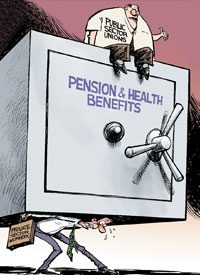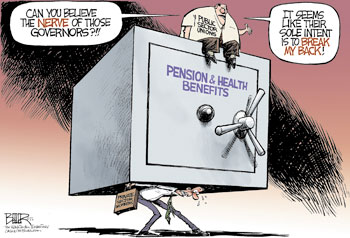
“Don’t let Walker take away our rights.” That claim is repeatedly heard in Wisconsin as public-union workers try to recall Republican state Senators who voted for Governor Scott Walker’s plan to require the workers to contribute more to their retirement and healthcare costs and limit their ability to use “collective bargaining” to increase pay and benefits.
Union workers claim that they are losing their “collective bargaining rights.” But are union workers really losing rights? It depends upon one’s definition of rights.
Tom Clementi, who defended the union line as a community columnist for the Appleton, Wisconsin, Post-Crescent, said that collective bargaining is a right because “federal and state law says so.” In other words, rights are what the government allows one to do. If one is guided by that definition, then collective bargaining would be a right, but following that line of reasoning, Aryan Germans had a “right” to persecute Jews in the 1930s and ’40s because government approved it. I doubt if most Americans — including Clementi — would be comfortable with that.
Let’s assume that Clementi meant that rights are “what the government allows one to do, as long as the actions taken don’t hurt other Americans.” After all, in Clementi’s world, though the state has the power to give you the “right” of collective bargaining, it shouldn’t have the power to take away that right. Assuming this is what Clementi meant would also put his comment about “federal and state law” more in line with American jurisprudence, which basically says that one’s rights end where another person’s nose begins. If one’s actions hurt another person physically, monetarily, or reputation-wise, one has overstepped one’s rights. How then does collective bargaining stand up as a right?
 Collective bargaining still fails to qualify as a “right” because collective bargaining definitely causes non-union workers to suffer. To understand how collective bargaining causes suffering, we must first understand what it is. Collective bargaining is more than just bargaining for wages as a group — if it were just that, it’s likely that few in the private sector would have a problem with it. In practice, it means that when a group of public workers form a union, they can demand under power of law that disagreements between them and their employers go into binding arbitration, and an arbitrator will decide how many of the union workers’ demands must be met in a negotiation period. (Any demands that are not met in one negotiation period will be sought in a following period — and then some.) Before making a decision, arbitrators are not obligated to first determine whether a community or the state can afford to make increased payments, and communities are not allowed to simply replace their workers and hire new staff if costs get too high.
Collective bargaining still fails to qualify as a “right” because collective bargaining definitely causes non-union workers to suffer. To understand how collective bargaining causes suffering, we must first understand what it is. Collective bargaining is more than just bargaining for wages as a group — if it were just that, it’s likely that few in the private sector would have a problem with it. In practice, it means that when a group of public workers form a union, they can demand under power of law that disagreements between them and their employers go into binding arbitration, and an arbitrator will decide how many of the union workers’ demands must be met in a negotiation period. (Any demands that are not met in one negotiation period will be sought in a following period — and then some.) Before making a decision, arbitrators are not obligated to first determine whether a community or the state can afford to make increased payments, and communities are not allowed to simply replace their workers and hire new staff if costs get too high.
This, and the fact that arbitrators are negotiating over seemingly bottomless taxpayer money, leads to a situation such as we have now in Wisconsin where teachers (public-union workers) make in excess of $75,000 per year on average, counting wages, benefits, and pensions, while private-sector workers make, on average, about $58,000, mainly without employer-supplied pensions.
Moreover, government costs and regulations are smothering businesses, causing many private-sector workers to lose their jobs. According to a March 2010 Christian Science Monitor article, at that time Wisconsin had its fewest jobs since 1995. Because any increase in union workers’ wages or pensions requires higher taxes, which in turn cause businesses to hire fewer workers, lay off workers, or close up shop altogether, any union demand that is met by an arbitrator causes non-union workers to suffer, ruling out collective bargaining as a right.
Also, the shoe never goes on the other foot. Employers cannot exercise the “right” to demand pay reductions, increased work days and work hours, and the power to go to arbitration to get their way. They also cannot bind employees to the contract — to force union workers to continue their employment even though the workers cannot afford wage and pension reductions offered by the community. If everyone doesn’t get equal treatment, something is not a right.
In this country, we are born with equal, inalienable rights. Government cannot grant rights. It can only secure rights or allow them to be violated. Government can grant “privileges,” but only at the expense of others’ rights. Just the fact that federal employees don’t have collective bargaining should demonstrate that it’s a privilege.
A true “right” is a universal, inherent freedom to do something without interference by other citizens or by government. It’s a freedom the government should secure for its citizens, but often doesn’t, such as happened when government failed to protect the right of women to vote and freedom from slavery for blacks.
When one group can impose obligations on another group — taking their time, services, and money — the second group loses its rights, and that’s un-American.



